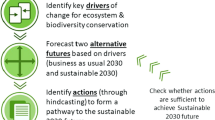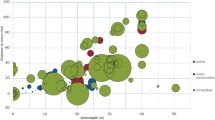Abstract
While Regional Fisheries Management Organizations (RFMOs) face many challenges in their pursuit of sustainable resource development, climate change is among the most pressing and least addressed. Research has identified a host of expected or ongoing physical, biological, ecological, and social impacts of climate change on the marine environment, creating a strong climate change adaptation imperative for RFMOs. Through a case study of the Inter-American Tropical Tuna Commission (IATTC), we describe two serious limitations of current RFMO climate change adaptation strategies: (1) a weakened efficacy of resource management and conservation policies caused by viewing climate change as a general climate stressor rather than a unique environmental challenge, and (2) a reliance on incremental policy reform, problematic because it may not enable a pace or scale of policy change proportional to the sustainable development challenges created by a rapidly changing ocean. We discuss the benefits and drawbacks of incrementalism and outline potential solutions to the environmental and structural challenges facing the IATTC and other RFMOs, including the concept of adaptation pathways.
Similar content being viewed by others
References
Allison, E. H., Perry, A. L., Badjeck, M., Adger, W., Brown, K., Conway, D., et al. (2009). Vulnerability of national economies to the impacts of climate change on fisheries. Fish and Fisheries, 10(2), 173–196.
Axelrod, M. (2011). Climate change and global fisheries management: linking issues to protect ecosystems or to save political interests? Global Environmental Politics, 11(3), 64–84.
Behrenfeld, M. J., O’Malley, R., Siegel, D. A., McClain, C. R., Sarmiento, J., Feldman, G. C., et al. (2006). Climate-driven trends in contemporary ocean productivity. Nature, 444(7120), 752–755.
Bell, J. D., Ganachaud, A., Gehrke, P. C., Griffiths, S. P., Hobday, A. J., Hoegh-Guldberg, O., et al. (2013). Mixed responses of tropical Pacific fisheries and aquaculture to climate change. Nature Climate Change, 3(6), 591.
Brander, K. M. (2007). Global fish production and climate change. Proceedings of the National Academy of Sciences, 104(50), 19709–19714.
Brander, K. M. (2010). Impacts of climate change on fisheries. Journal of Marine Systems, 79(3), 389–402.
Brander, K. M. (2015). Improving the reliability of fishery predictions under climate change. Current Climate Change Reports, 1(1), 40–48.
Britten, G. L., Dowd, M., & Worm, B. (2016). Changing recruitment capacity in global fish stocks. Proceedings of the National Academy of Sciences, 113(1), 134–139.
Bromhead, D., Scholey, V., Nicol, S., Margulies, D., Wexler, J., Stein, M., et al. (2015). The potential impact of ocean acidification upon eggs and larvae of yellowfin tuna (Thunnus albacares). Deep Sea Research Part II: Topical Studies in Oceanography, 113, 268–279.
Brooks, C. M. (2013). Competing values on the Antarctic high seas: CCAMLR and the challenge of marine-protected areas. The Polar Journal, 3(2), 277–300.
Brooks, C. M., Crowder, L. B., Curran, L. M., Dunbar, R. B., Ainley, D. G., Dodds, K. J., Gjerde, K. M. & Sumaila, U. R. (2016). Science-based management in decline in the Southern Ocean. Science, 354(6309), 185–187.
Brooks, C. M., Ainley, D. G., Abrams, P. A., Dayton, P. K., Hofman, R. J., Jacquet, J., et al. (2018). Antarctic fisheries: Factor climate change into their management. Nature, 558(7709), 177–180.
Butchart, S. H., Walpole, M., Collen, B., Van Strien, A., Scharlemann, J. P., Almond, R. E., et al. (2010). Global biodiversity: Indicators of recent declines. Science, 328(5982), 1164–1168.
Byrne, M. (2011). Impact of ocean warming and ocean acidification on marine invertebrate life history stages: Vulnerabilities and potential for persistence in a changing ocean. Oceanography and Marine Biology: An Annual Review, 49, 1–42.
Cheng, L., Abraham, J., Hausfather, Z., & Trenberth, K. E. (2019). How fast are the oceans warming? Science, 363(6423), 128–129.
Cheung, W. W., Close, C., Lam, V., Watson, R., & Pauly, D. (2008). Application of macroecological theory to predict effects of climate change on global fisheries potential. Marine Ecology Progress Series, 365, 187–197.
Cheung, W. W., Jones, M. C., Reygondeau, G., Stock, C. A., Lam, V. W., & Frölicher, T. L. (2016). Structural uncertainty in projecting global fisheries catches under climate change. Ecological Modelling, 325, 57–66.
Cheung, W. W., Lam, V. W., Sarmiento, J. L., Kearney, K., Watson, R. E. G., Zeller, D., et al. (2010). Large-scale redistribution of maximum fisheries catch potential in the global ocean under climate change. Global Change Biology, 16(1), 24–35.
Cheung, W. W., Watson, R., & Pauly, D. (2013). Signature of ocean warming in global fisheries catch. Nature, 497(7449), 365–368.
Cinner, J. E., McClanahan, T., Graham, N. A., Pratchett, M. S., Wilson, S. K., & Raina, J. B. (2009). Gear-based fisheries management as a potential adaptive response to climate change and coral mortality. Journal of Applied Ecology, 46(3), 724–732.
de Bruyn, P., Murua, H., & Aranda, M. (2013). The Precautionary approach to fisheries management: How this is taken into account by Tuna regional fisheries management organisations (RFMOs). Marine Policy, 38, 397–406.
Delworth, T. L., Zeng, F., Vecchi, G. A., Yang, X., Zhang, L., & Zhang, R. (2016). The North Atlantic Oscillation as a driver of rapid climate change in the Northern Hemisphere. Nature Geoscience, 9(7), 509.
Del Raye, G., & Weng, K. C. (2015). An aerobic scope-based habitat suitability index for predicting the effects of multi-dimensional climate change stressors on marine teleosts. Deep Sea Research Part II: Topical Studies in Oceanography, 113, 280–290.
Desombre, E. (1999). Tuna fishing and common pool resources. In J. S. Barkin & G. E. Shambaugh (Eds.), Anarchy and the environment: The international relations of common pool resources (pp. 51–69). New York: State University of New York Press.
Doney, S. C., Ruckelshaus, M., Duffy, J. E., Barry, J. P., Chan, F., English, C. A., et al. (2012). Climate change impacts on marine ecosystems. Annual Review of Marine Science, 4, 11–37.
Dueri, S., Bopp, L., & Maury, O. (2014). Projecting the impacts of climate change on skipjack tuna abundance and spatial distribution. Global Change Biology, 20(3), 742–753.
Dueri, S., Guillotreau, P., Jiménez-Toribio, R., Oliveros-Ramos, R., Bopp, L., & Maury, O. (2016). Food security or economic profitability? Projecting the effects of climate and socioeconomic changes on global skipjack tuna fisheries under three management strategies. Global Environmental Change, 41, 1–12.
Dunstan, P. K., Moore, B. R., Bell, J. D., Holbrook, N. J., Oliver, E. C., Risbey, J., et al. (2018). How can climate predictions improve sustainability of coastal fisheries in Pacific Small-Island Developing States? Marine Policy, 88, 295–302.
Everson, I. (2017). Designation and management of large-scale MPAs drawing on the experiences of CCAMLR. Fish and Fisheries, 18(1), 145–159.
Frainer, A., Primicerio, R., Kortsch, S., Aune, M., Dolgov, A. V., Fossheim, M., et al. (2017). Climate-driven changes in functional biogeography of Arctic marine fish communities. Proceedings of the National Academy of Sciences, 114(46), 12202–12207.
Frommel, A. Y., Margulies, D., Wexler, J. B., Stein, M. S., Scholey, V. P., Williamson, J. E., et al. (2016). Ocean acidification has lethal and sub-lethal effects on larval development of yellowfin tuna, Thunnus albacares. Journal of Experimental Marine Biology and Ecology, 482, 18–24.
Gamito, R., Costa, M. J., & Cabral, H. N. (2015). Fisheries in a warming ocean: trends in fish catches in the large marine ecosystems of the world. Regional Environmental Change, 15(1), 57–65.
Grafton, R. Q. (2010). Adaptation to climate change in marine capture fisheries. Marine Policy, 34(3), 606–615.
Green, A. L., Fernandes, L., Almany, G., Abesamis, R., McLeod, E., Aliño, P. M., et al. (2014). Designing marine reserves for fisheries management, biodiversity conservation, and climate change adaptation. Coastal Management, 42(2), 143–159.
Hanich, Q., Campbell, B., Bailey, M., & Molenaar, E. (2015). Research into fisheries equity and fairness—Addressing conservation burden concerns in transboundary fisheries. Marine Policy, 51, 302–304.
Harrison, D. E., & Chiodi, A. M. (2015). Multi-decadal variability and trends in the El Nino-Southern oscillation and tropical pacific fisheries implications. Deep-Sea Research Part II-Topical Studies in Oceanography, 113, 9–21.
Heenan, A., Pomeroy, R., Bell, J., Munday, P. L., Cheung, W., Logan, C., et al. (2015). A climate-informed, ecosystem approach to fisheries management. Marine Policy, 57, 182–192.
Hoegh-Guldberg, O. (2011). Coral reef ecosystems and anthropogenic climate change. Regional Environmental Change, 11(1), 215–227.
Hoegh-Guldberg, O., & Bruno, J. F. (2010). The impact of climate change on the World’s marine ecosystems. Science, 328(5985), 1523–1528.
Holling, C. S. (1978). Adaptive environmental assessment and management. New York: Wiley.
Hurd, I. (2012). Almost saving whales: The ambiguity of success at the International Whaling Commission. Ethics & International Affairs, 26(1), 103–112.
IATTC. (2003). Convention for the Strengthening of the Inter-American Tropical Tuna Commission Established by the 1949 Convention between the United States of America and the Republic of Costa Rica (Antigua Convention).
IATTC. (2017). IATTC Scientific Advisory Committee—Eight Meeting Report of the Meeting. https://www.iattc.org/Meetings/Meetings2017/SAC-08/PDFs/Docs/_English/SAC-08-RPT_8th-Meeting-of-the-Scientific-Advisory-Committee.pdf. Accessed 10 July 2019.
IPBES. (2019). Summary for policymakers of the global assessment report on biodiversity and ecosystem services. Available at: https://cdn2.hubspot.net/hubfs/4783129/Summary%20for%20Policymakers%20IPBES%20Global%20Assessment.pdf?__hstc=&__hssc=&hsCtaTracking=91fd55c1-7918-40d1-a145-73e8dab568a9%7C67bf054a-fcc7-448e-9235-42416b2b6e88. Accessed 10 July 2019.
IPCC. (2014). Climate Change 2014: Synthesis Report Contribution of Working Groups I, II and III to the Fifth Assessment Report of the Intergovernmental Panel on Climate Change [Core Writing Team, RK Pachauri and LA Meyer (eds)] IPCC, Geneva, Switzerland, 151 pp.
Juan-Jordá, M., Mosqueira, I., Cooper, A. B., Freire, J., & Dulvy, N. K. (2011). Global population trajectories of tunas and their relatives. PNAS, 108, 20650–20655.
Juan-Jordá, M., Murua, H., Arrizabalaga, H., Dulvy, N. K., & Restrepo, V. (2018). Report card on ecosystem-based fisheries management in tuna regional fisheries management organizations. Fish and Fisheries, 19(2), 321–339.
Kell, L. T., Pilling, G. M., & O'Brien, C. M. (2005). Implications of climate change for the management of North Sea cod (Gadus morhua). ICES Journal of Marine Science, 62(7), 1483–1491.
Kurihara, H. (2008). Effects of CO2-driven ocean acidification on the early developmental stages of invertebrates. Marine Ecology Progress Series, 373, 275–284.
Lehodey P., Hampton J., Brill R.W., Nicol S., Senina I., Calmettes B., et al. (2011). Vulnerability of oceanic fisheries in the tropical Pacific to climate change. In: J. Bell, J. E. Johnson and A. J. Hobday (Eds.), Vulnerability of tropical pacific fisheries and aquaculture to climate change. Secretariat of the Pacific Community, New Caledonia.
Lehodey, P., Senina, I., Calmettes, B., Hampton, J., & Nicol, S. (2013). Modelling the impact of climate change on Pacific skipjack tuna population and fisheries. Climatic Change, 119(1), 95–109.
Lehodey, P., Senina, I., Nicol, S., & Hampton, J. (2015). Modelling the impact of climate change on south pacific albacore tuna. Deep-Sea Research Part II-Topical Studies in Oceanography, 113, 246–259.
Lehodey, P., Senina, I., Sibert, J., Bopp, L., Calmettes, B., Hampton, J., et al. (2010). Preliminary forecasts of Pacific bigeye tuna population trends under the A2 IPCC scenario. Progress in Oceanography, 86(1–2), 302–315.
Lindblom, C. E. (1959). The science of muddling through. Public Administration Review, 19(2), 79–88.
Ling, S. D., & Johnson, C. R. (2012). Marine reserves reduce risk of climate-driven phase shift by reinstating size-and habitat-specific trophic interactions. Ecological Applications, 22(4), 1232–1245.
McCauley, D. J., Pinsky, M. L., Palumbi, S. R., Estes, J. A., Joyce, F. H., & Warner, R. R. (2015). Marine defaunation: Animal loss in the global ocean. Science, 347(6219), 1255641.
McLain, R. J., & Lee, R. G. (1996). Adaptive management: Promises and pitfalls. Environmental management, 20(4), 437–448.
McLeod, E., Salm, R., Green, A., & Almany, J. (2009). Designing marine protected area networks to address the impacts of climate change. Frontiers in Ecology and the Environment, 7(7), 362–370.
McIlgorm, A., Hanna, S., Knapp, G., Le Floc’H, P., Millerd, F., & Pan, M. (2010). How will climate change alter fishery governance? Insights from seven international case studies. Marine Policy, 34(1), 170–177.
Merino, G., Barange, M., Blanchard, J. L., Harle, J., Holmes, R., Allen, I., et al. (2012). Can marine fisheries and aquaculture meet fish demand from a growing human population in a changing climate? Global Environmental Change, 22(4), 795–806.
Mislan, K. A. S., Deutsch, C. A., Brill, R. W., Dunne, J. P., & Sarmiento, J. L. (2017). Projections of climate driven changes in tuna vertical habitat based on species-specific differences in blood oxygen affinity. Global Change Biology, 23(10), 4019–4028.
Muhling, B. A., Lee, S.-K., Lamkin, J. T., & Liu, Y. (2011). Predicting the effects of climate change on bluefin tuna (Thunnus thynnus) spawning habitat in the Gulf of Mexico. ICES Journal of Marine Science, 68, 1051–1062.
Munang, R., Thiaw, I., Alverson, K., Mumba, M., Liu, J., & Rivington, M. (2013). Climate change and ecosystem-based adaptation: A new pragmatic approach to buffering climate change impacts. Current Opinion in Environmental Sustainability, 5(1), 67–71.
Narita, D., Rehdanz, K., & Tol, R. S. (2012). Economic costs of ocean acidification: A look into the impacts on global shellfish production. Climatic Change, 113(3–4), 1049–1063.
Olson, R. J., Duffy, L. M., Kuhnert, P. M., Galvan-Magana, F., Bocanegra-Castillo, N., & Alatorre-Ramirez, V. (2014). Decadal diet shift in yellowfin tuna Thunnus albacares suggests broad-scale food web changes in the eastern tropical Pacific Ocean. Marine Ecology Progress Series, 497, 157–178.
Ojea, E., Pearlman, I., Gaines, S. D., & Lester, S. E. (2017). Fisheries regulatory regimes and resilience to climate change. Ambio, 46(4), 399–412.
Pauly, D., & Zeller, D. (2016). Catch reconstructions reveal that global marine fisheries catches are higher than reported and declining. Nature Communications, 7, pncomms10244.
Payne, M. R., Barange, M., Cheung, W. W., MacKenzie, B. R., Batchelder, H. P., Cormon, X., et al. (2015). Uncertainties in projecting climate-change impacts in marine ecosystems. ICES Journal of Marine Science, 73(5), 1272–1282.
Pentz, B., & Klenk, N. (2017). The ‘responsiveness gap’ in RFMOs: The critical role of decision-making policies in the fisheries management response to climate change. Ocean & Coastal Management, 145, 44–51.
Pentz, B., Klenk, N., Ogle, S., & Fisher, J. A. D. (2018). Can regional fisheries management organizations (RFMOs) manage resources effectively during climate change? Marine Policy, 92, 13–20.
Pereira, H. M., Leadley, P. W., Proença, V., Alkemade, R., Scharlemann, J. P., Fernandez-Manjarrés, J. F., et al. (2010). Scenarios for global biodiversity in the 21st century. Science, 330(6010), 1496–1501.
Pinsky, M. L., & Mantua, N. J. (2014). Emerging adaptation approaches for climate-ready fisheries management. Oceanography, 27(4), 146–159.
Pinsky, M. L., Reygondeau, G., Caddell, R., Palacios-Abrantes, J., Spijkers, J., & Cheung, W. W. (2018). Preparing ocean governance for species on the move. Science, 360(6394), 1189–1191.
Quay, R. (2010). Anticipatory governance: A tool for climate change adaptation. Journal of the American Planning Association, 76(4), 496–511.
Rayfuse, R. (2018). Climate change and antarctic fisheries: Ecosystem management in CCAMLR. Ecology LQ, 45, 53.
Rayfuse, R. (2019). Addressing climate change impacts in regional fisheries management organizations. In R. Caddell & E. J. Molenaar (Eds.), Strengthening international fisheries law in an era of changing oceans (pp. 247–268). Oxford: Hart Publishing.
Rice, J. C., & Garcia, S. M. (2011). Fisheries, food security, climate change, and biodiversity: Characteristics of the sector and perspectives on emerging issues. ICES Journal of Marine Science, 68, 1343–1353.
Risbey, J. S., Lewandowsky, S., Langlais, C., Monselesan, D. P., O’Kane, T. J., & Oreskes, N. (2014). Well-estimated global surface warming in climate projections selected for ENSO phase. Nature Climate Change, 4(9), 835.
Roberts, C. M., O’Leary, B. C., McCauley, D. J., Cury, P. M., Duarte, C. M., Lubchenco, J., et al. (2017). Marine reserves can mitigate and promote adaptation to climate change. Proceedings of the National Academy of Sciences, 114(24), 6167–6175.
Robinson, L. M., Hobday, A. J., Possingham, H. P., & Richardson, A. J. (2015). Trailing edges projected to move faster than leading edges for large pelagic fish habitats under climate change. Deep-Sea Research Part II: Topical Studies in Oceanography, 113, 225–234.
Saunders, M. I., Leon, J. X., Callaghan, D. P., Roelfsema, C. M., Hamylton, S., Brown, C. J., et al. (2014). Interdependency of tropical marine ecosystems in response to climate change. Nature Climate Change, 4(8), 724–729.
Schindler, D. E., & Hilborn, R. (2015). Prediction, precaution, and policy under global change. Science, 347(6225), 953–954.
Schultz, L., Folke, C., Österblom, H., & Olsson, P. (2015). Adaptive governance, ecosystem management, and natural capital. Proceedings of the National Academy of Sciences, 112(24), 7369–7374.
Sumaila, U. R., Lam, V. W. Y., Miller, D. D., Teh, L., Watson, R., Zeller, D., et al. (2015). Winners and losers in a world where the high seas is closed to fishing. Scientific Reports, 5, 8481. https://doi.org/10.1038/srep08481.
UN. (2015). Transforming our world: The 2030 agenda for sustainable development. A/RES/70/1.
UNFAO. (2018). The State of World Fisheries and Aquaculture 2018—Meeting the sustainable development goals. Rome Licence: CC BY-NC-SA 30 IGO.
Walters, C. J. (1986). Adaptive management of renewable resources. New York, NY: Macmillan Publishers Ltd.
Walters, C. J., & Hilborn, R. (1978). Ecological optimization and adaptive management. Annual Review of Ecology and Systematics, 9(1), 157–188.
Walther, G. R. (2010). Community and ecosystem responses to recent climate change. Philosophical Transactions of the Royal Society B: Biological Sciences, 365(1549), 2019–2024.
Wang, J., Chen, X., & Chen, Y. (2016). Spatio-temporal distribution of skipjack in relation to oceanographic conditions in the west-central Pacific Ocean. International Journal of Remote Sensing, 37(24), 6149–6164.
Wernberg, T., Bennett, S., Babcock, R. C., de Bettignies, T., Cure, K., Depczynski, M., et al. (2016). Climate-driven regime shift of a temperate marine ecosystem. Science, 353(6295), 169–172.
Wise, R. M., Fazey, I., Smith, M. S., Park, S. E., Eakin, H. C., Van Garderen, E. A., et al. (2014). Reconceptualising adaptation to climate change as part of pathways of change and response. Global Environmental Change, 28, 325–336.
Woodworth-Jefcoats, P. A., Polovina, J. J., & Drazen, J. C. (2017). Climate change is projected to reduce carrying capacity and redistribute species richness in North Pacific pelagic marine ecosystems. Global Change Biology,23(3), 1000–1008.
Funding
This research did not receive any specific grant from funding agencies in the public, commercial, or not-for-profit sectors.
Author information
Authors and Affiliations
Corresponding author
Ethics declarations
Conflict of interest
The authors declare no conflict of interest.
Additional information
Publisher's Note
Springer Nature remains neutral with regard to jurisdictional claims in published maps and institutional affiliations.
Rights and permissions
About this article
Cite this article
Pentz, B., Klenk, N. Understanding the limitations of current RFMO climate change adaptation strategies: the case of the IATTC and the Eastern Pacific Ocean. Int Environ Agreements 20, 21–39 (2020). https://doi.org/10.1007/s10784-019-09452-9
Accepted:
Published:
Issue Date:
DOI: https://doi.org/10.1007/s10784-019-09452-9




